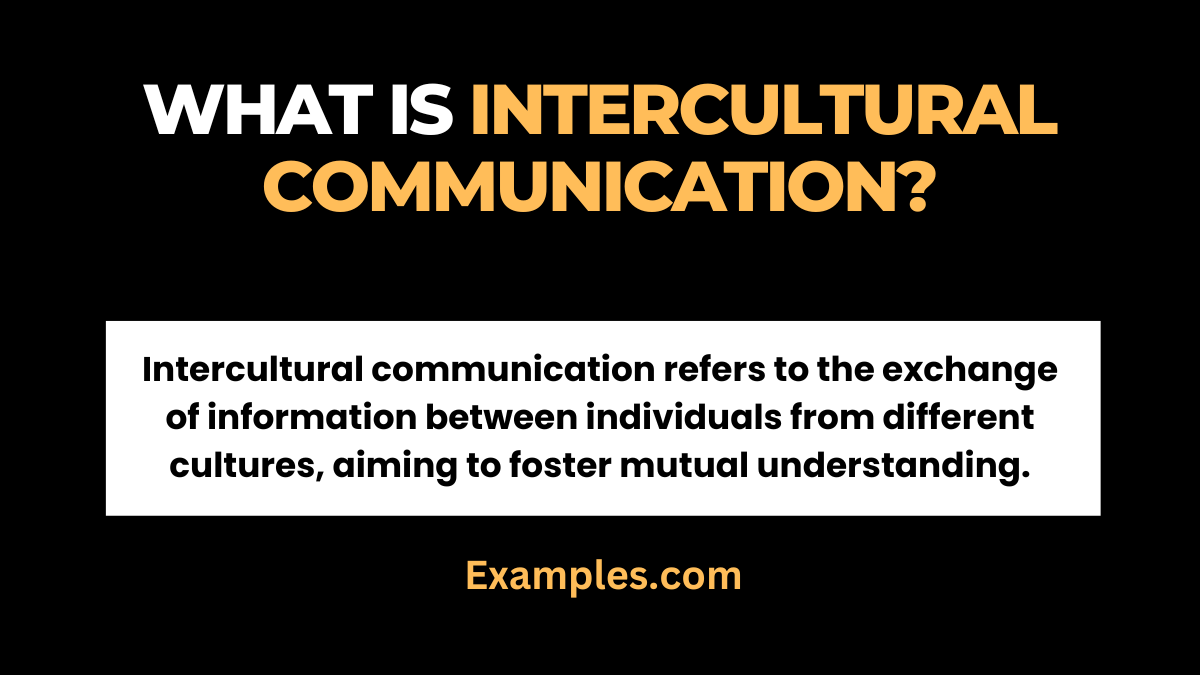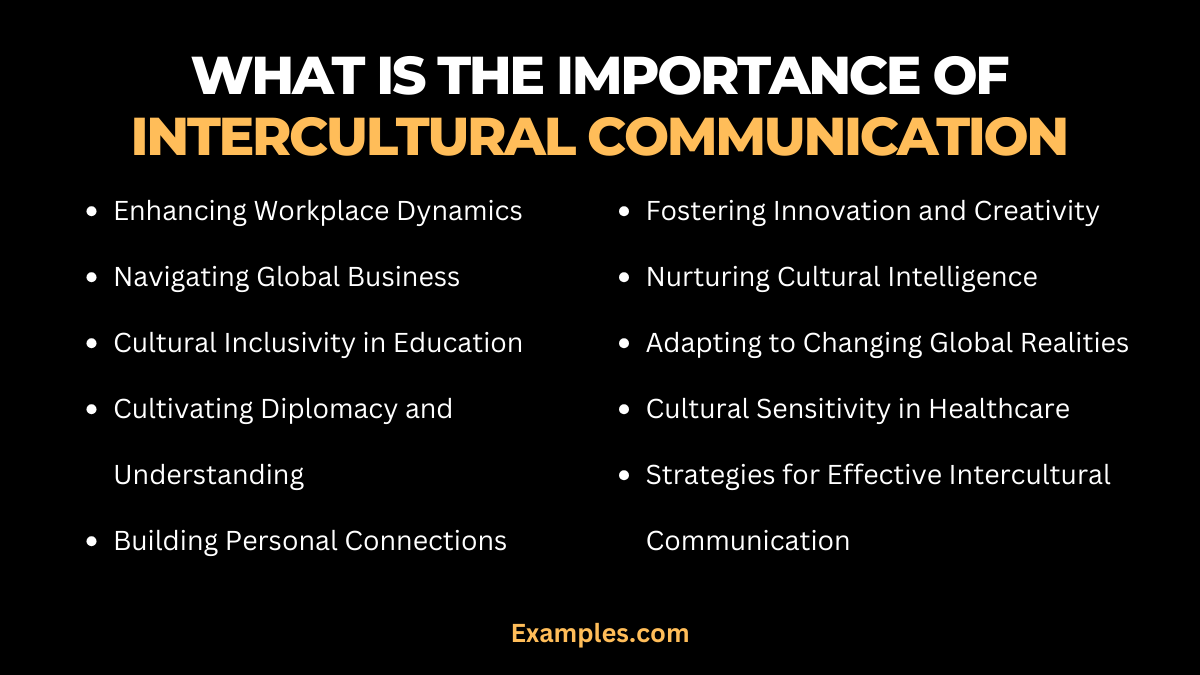Importance of Intercultural Communication
Embark on a transformative journey into the Importance of Intercultural Communication. This comprehensive guide illuminates the significance of fostering cross-cultural understanding. Delve into real-world Communication Examples, empowering you to navigate diverse landscapes with finesse. Learn strategic tips to bridge cultural gaps, enhancing your interpersonal connections and global collaboration. Uncover the keys to effective intercultural communication for a richer, more interconnected world.
What is Intercultural Communication

Intercultural communication refers to the exchange of information between individuals from different cultures, aiming to foster mutual understanding. It involves navigating diverse cultural contexts, recognizing nuances, and adapting communication styles. This dynamic process promotes respect, empathy, and effective dialogue across cultural boundaries. The essence lies in bridging differences, embracing diversity, and creating connections that transcend cultural barriers, contributing to a harmonious global community.
Importance of Intercultural Communication in the Workplace
Enhancing workplace diversity through intercultural communication is crucial for fostering innovation, collaboration, and a harmonious work environment. It enables effective teamwork, reduces misunderstandings, and promotes a culturally inclusive organizational culture.
- Global Team Collaboration: In multinational companies, intercultural communication ensures seamless collaboration among diverse teams, harnessing a wealth of perspectives for optimal outcomes.
Example: Successfully managing projects with team members from Japan, India, and the United States. - Conflict Resolution Skills: Intercultural communication equips employees with conflict resolution skills, addressing cultural differences diplomatically and maintaining a positive work atmosphere.
Example: Resolving a disagreement between colleagues from different cultural backgrounds. - Cultural Competence Training: Organizations invest in cultural competence training to equip employees with the skills needed to thrive in a globalized workplace, fostering a culture of respect and understanding.
Example: Participating in workshops on cultural competence to enhance workplace communication. - Cross-Cultural Leadership: Intercultural communication is essential for leaders to navigate diverse teams successfully, promoting effective leadership styles that resonate with employees from various cultural backgrounds.
Example: Implementing leadership strategies that consider cultural nuances for team cohesion. - Increased Employee Engagement: Recognizing and appreciating diverse perspectives through intercultural communication leads to higher employee engagement, job satisfaction, and overall organizational success.
Example: Engaging in cross-cultural team-building activities to strengthen interpersonal bonds.
Importance of Intercultural Communication in Education
In education, intercultural communication fosters a rich learning environment, preparing students to navigate a globalized world with cultural sensitivity and open-mindedness.
- Cultural Exchange Programs: Intercultural communication in education involves implementing cultural exchange programs, allowing students to interact with peers from different backgrounds.
Example: Participating in a student exchange program to enhance cultural understanding. - Global Learning Initiatives: Educational institutions prioritize global learning initiatives, incorporating diverse perspectives into curricula to prepare students for a connected world.
Example: Studying global issues with a curriculum that includes contributions from various cultures. - Language Learning Opportunities: Intercultural communication in education provides language learning opportunities, encouraging students to become proficient in languages beyond their native tongue.
Example: Mastering Mandarin through language courses and cultural immersion activities. - Intercultural Competence Curriculum: Educational programs focus on developing intercultural competence as part of the curriculum, nurturing students’ ability to communicate effectively across cultural boundaries.
Example: Completing a course on intercultural competence, enhancing communication skills. - Diversity in Educational Resources: Intercultural communication ensures diverse perspectives are represented in educational resources, fostering an inclusive learning environment.
Example: Using textbooks and materials that showcase contributions from various cultures.
what is the Importance of Intercultural Communication
Intercultural communication plays a pivotal role in fostering connections and collaborations among individuals from diverse cultural backgrounds. This guide delves into the multifaceted importance of intercultural communication, examining its impact on various aspects of our personal and professional lives.

- Enhancing Workplace Dynamics: Explore how intercultural communication contributes to a harmonious and productive workplace. Discover strategies to leverage diverse perspectives, encourage teamwork, and mitigate misunderstandings, ultimately fostering a thriving work environment.
- Navigating Global Business: In the context of globalization, uncover the crucial role intercultural communication plays in international business. Delve into examples of successful global communication strategies, understanding how cultural awareness influences business negotiations and partnerships.
- Cultural Inclusivity in Education: This section examines the significance of intercultural communication in educational settings. Learn how educational institutions prioritize cultural inclusivity, incorporating diverse perspectives into curricula, and creating an environment that prepares students for a globally interconnected world.
- Cultivating Diplomacy and Understanding: Intercultural communication is a cornerstone of diplomatic relations. Explore how it fosters understanding between nations, mitigates cultural misunderstandings, and contributes to peaceful coexistence in a world marked by cultural diversity.
- Building Personal Connections: Uncover the importance of intercultural communication in personal relationships. From friendships to romantic connections, learn how effective communication across cultural boundaries enhances understanding, empathy, and the richness of personal interactions.
- Fostering Innovation and Creativity: Discover how diverse perspectives, facilitated by intercultural communication, drive innovation and creativity. Explore case studies showcasing how organizations harness cultural diversity to fuel ground-breaking ideas and solutions.
- Nurturing Cultural Intelligence: Cultural intelligence is a key competency in today’s globalized world. This section explores how intercultural communication contributes to the development of cultural intelligence, empowering individuals to navigate diverse cultural landscapes successfully.
- Adapting to Changing Global Realities: As the world undergoes constant change, intercultural communication equips individuals and organizations with the flexibility to adapt. Understand the role of intercultural communication in navigating evolving global challenges and opportunities.
- Cultural Sensitivity in Healthcare: Dive into the importance of intercultural communication in healthcare. Learn how healthcare professionals can enhance cultural sensitivity, improve patient care, and build trust with diverse patient populations.
- Strategies for Effective Intercultural Communication: This guide concludes with actionable strategies for improving intercultural communication. From active listening techniques to cultural sensitivity training, discover practical approaches to enhance communication across cultural boundaries.
In conclusion, recognizing the pivotal role of intercultural communication is essential for thriving in our interconnected world. From fostering inclusive workplaces and global business success to nurturing cultural intelligence, its significance is paramount. Embracing the richness of diverse perspectives not only enhances personal connections but also sparks innovation. As we navigate the complexities of our global reality, prioritizing effective intercultural communication contributes to a harmonious and cooperative society, promoting understanding, respect, and the collective pursuit of shared goals.



